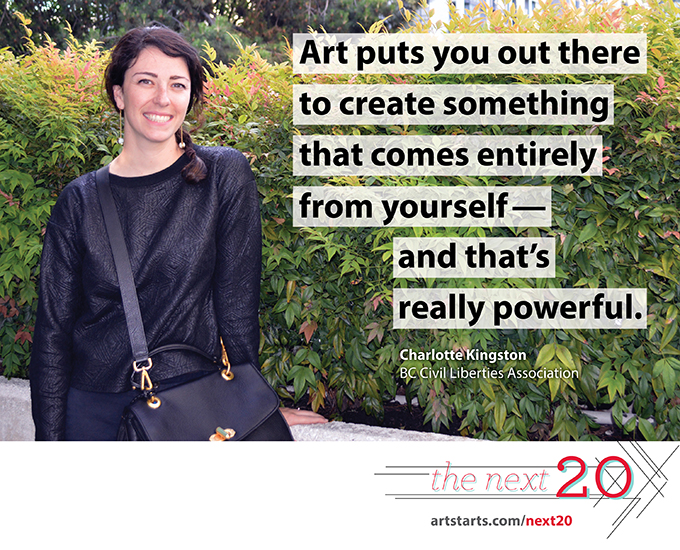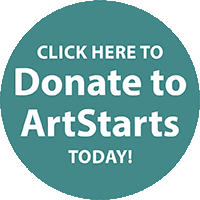June 28, 2016
The Next 20: Charlotte Kingston

This year is ArtStarts' 20th Anniversary. As we celebrate our accomplishments and impact, we are also inspired to think ahead about what the next 20 years hold for young people. What role can art and creativity play to support our next generation to thrive in the future?
To help us explore this question, we sat down with 20 community leaders across different sectors and asked them to share their story and thoughts on the relevance of art and creativity. Over 20 weeks, we'll share these stories with you. We hope that they will inspire you to join our community of supporters so that together we can continue to build a bright future for BC's young people.
This week's Next 20 community builder is Charlotte Kingston. Charlotte is the Director of Community Engagement for the BC Civil Liberties Association. She is passionate about human rights and social change. She has worked as a facilitation trainer for youth and community groups, and for several post-secondary student organizations promoting access to education. Her academic work focuses on truth and reconciliation processes between the Indigenous and settler peoples of Canada. She strives to create opportunities for democratic dialogue between all segments of Canadian society and engage community members in important conversations about public policy.
Tell us about the work that you do.
I work for the BC Civil Liberties Association. We are Canada's oldest and most active human rights and civil liberties association. We defend people's charter rights primarily, but also their human rights. We're about half lawyers and half non-lawyers. Our legal staff is really busy fighting in the courts, particularly around people's established charter rights. The rest of our staff works around public education and campaigning to change the way people think about human rights issues and also to expand the conversation that can be had in the courts about what legal rights are and what they should be.
As the Director of Community Engagement, I oversee the department that does communication, fundraising and campaigning for the organization. I've always been interested between the intersection of law and social change. I'm very glad to have landed with the BCCLA because I think that we are doing some of the most innovative and creative work in this field. That's what attracted me to the organization: they're very open to innovation. They have a lot of room and space for creativity.
What were influences in your life?
My parents are both labourers, they both work for unions. I grew up with a fairly high degree of class-consciousness and an understanding of opportunities and privilege through that lens. I'm a woman and an LGBTQ woman, so as time rolled on, my understanding of my positionality and the important ways that privilege and oppression intersect made me feel that this is work that's meaningful to me.
 What is creativity?
What is creativity?
To me, the BCCLA is an organization that's really willing to take risks. We also believe a lot in our own voice. For me, when I think about creativity, I think that those are actually foundational understandings and outcomes of creativity. I think there's a certain vulnerability when you create something and put it out to the world and just see what happens. I think that artists all over that world are doing that so fearlessly all the time. I think our organization does a lot. We're willing to take risks on issues before other people are. We're willing to push the boundaries of human rights in this country and we're willing to do it in new ways all the time. We're an old organization, we've been around for 55 years, but every day we change what our expectations are about how this work should be done and who should be involved in it and who it is for.
What encourages or inhibits creativity?
Time and space are important for creativity. When people have no space to consider or innovate, they just do what they know they can do. That stifles creativity. I also think time and space allow new neuro pathways to form. We're used to running along the same neuro pathways, when we do the same thing every day, we become unconscious of what we're doing. I think that time and space give us the ability to fire new neurons to come up with new strategies.
I think fear inhibits creativity. For me it goes back to the idea that I find creativity to be a vulnerable space. It's scary to put that out into the world cause there's a strong chance that other people will find that idea terrible. So I think fear holds people back a lot. Safe spaces are really important, so that people have room to be vulnerable and fail.
What is the role of the arts in education in the future?
I think art helps young people to find their voice. I hope it helps them to feel more fearless. I think that's what people use all day regardless of their career choices. You have to believe that you have something valuable to contribute and that requires you to be vulnerable and fearless. I think that's a foundational learning for people. Art puts you out there to create something that comes entirely from yourself—and that's really powerful. I don’t know if there is anything else that does that.
What do you think the world will be like in 20 years?
I wonder if privacy will continue to be meaningful to subsequent generations. I wonder what that will mean for people's creativity because now we moderate ourselves based on private and public spaces and when that collapses, when everything we say is visible to anyone at anytime, I think that will cause us to moderate ourselves even more.
As much as I believe that we will be more integrated with technology, I do also think that we may choose to more consciously step away from it. Carving out time and space when we are apart from our devices and the internet, which is just our collective knowledge, and to go back into being individuals apart from the connections we made through the internet. I think our drive to be more integrated with technology will run up with the human wish to be alone with our thoughts.
We want to hear from you!
How does being creative make you feel empowered?
Share your ideas on Facebook.
At ArtStarts in Schools, we want to ensure that young people across British Columbia have opportunities to develop their curiosity and creative potential and to build skills to thrive in the next 20 years—and beyond.
You can help us realize our vision by donating today and joining our community of supporters.
Learn more about ArtStarts in Schools and the work we do and discover additional ways you can show your support.
Keep up with the Next 20 interviews on Facebook, Twitter or Instagram. Sign up for our newsletter to get all the latest ArtStarts news.
Past Stories
Search by category
Accessibility | AIC Projects | Arts Integration in Action | ArtStarts Artists | ArtStarts Team | Community Events and Engagement | Exhibitions | Grants | Guest Blog | Infusion Pro-D | Knowledge Philanthropist | Meet a Community Art Star | Showcase | Supporters | The Next 20


